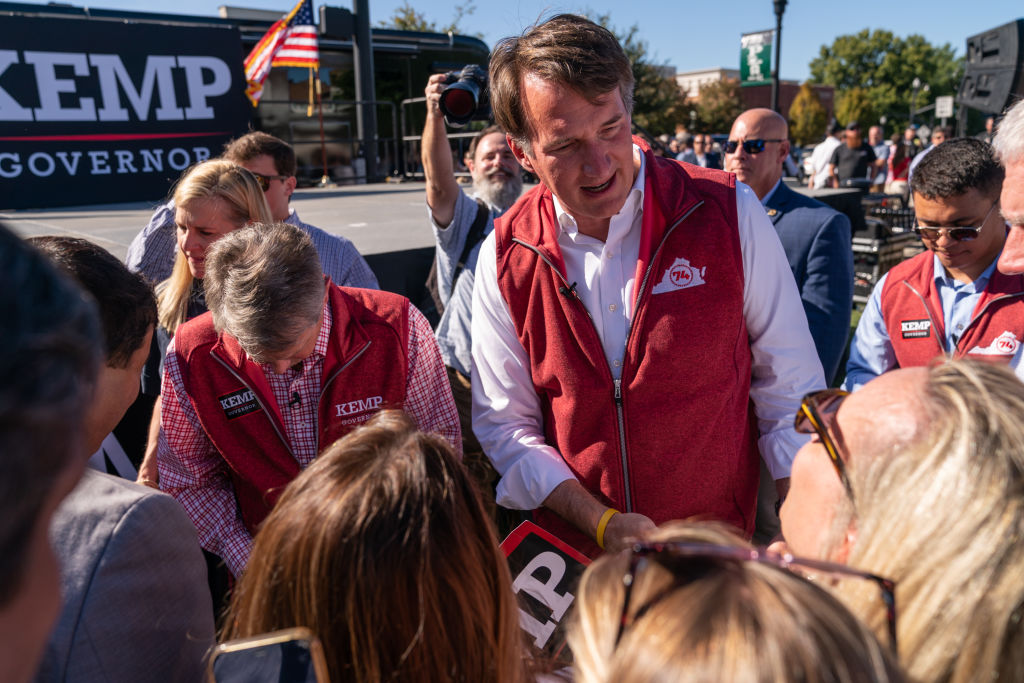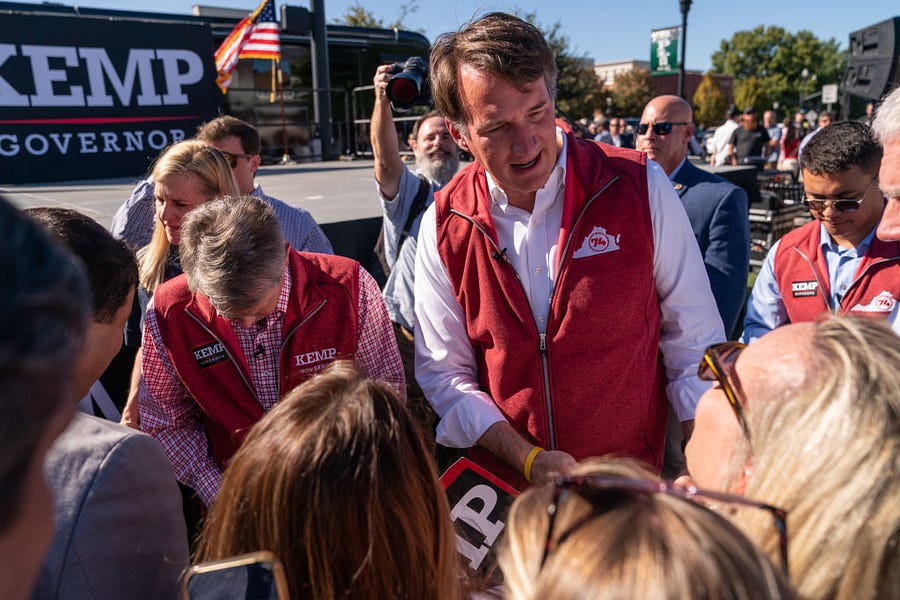Reminder: There are only three days left to take advantage of a 20 percent discount to an annual subscription to The Dispatch. If you enjoy this newsletter and haven’t subscribed yet, please do.

Last week Damon Linker challenged me on my first piece for The Dispatch, in which I speculated that Donald Trump might attack Ron DeSantis sooner than anyone expects. He would be foolish to do so, Linker argued, as that would “elevate” DeSantis to the status of a credible rival. What Trump should do instead is declare his 2024 candidacy soon, while DeSantis is preoccupied with winning a second term as governor, and then behave as if that settles the matter. “He would in effect be anointing himself the nominee and daring any would-be challenger to try and knock him off the pedestal,” in Linker’s words.
It’s a fine idea. I had it myself in a previous life. If we were staring at a Trump/DeSantis death match in 2024, I’d agree with Linker that the prospect of stepping forward, alone, to strike at the king might prove too daunting for DeSantis.
But we aren’t. As preposterous as it is to imagine Mike Pompeo unseating Trump in a modern Republican primary, every indication is that he intends to try. Ditto for Mike Pence, who’s been turning up in states like Iowa this summer and laying the proverbial groundwork for a presidential campaign since spring. No one wants to carry the stigma of being the first candidate to declare his belief that the party can and should do better than Trump in 2024, knowing how MAGA diehards will react. But the second candidate? Or third, or fourth, or 12th?
The more crowded the field gets, the less of a personal affront to Trump it is for each successive candidate to enter. If he’s destined to get one challenger, he’s destined to get several. In which case he might as well preemptively attack DeSantis, the only man with a chance of unseating him as nominee.
Or is he?
According to Maggie Haberman, the donor class lately has its eye on another prospect.
As you’re reading this on Thursday, Youngkin is hosting a two-day retreat in his home state for several dozen top Republican donors. There’s barely a pretense that the event is about anything other than a potential Youngkin 2024 candidacy. “This is 100 percent, ‘Is Glenn of presidential timber? Does he have it?’” said one source to the Washington Post, describing the retreat as an opportunity for mega-bucks conservatives to “kick the tires” on Youngkin’s potential national appeal.
Could a private-equity guy known for wearing fleece vests be the post-Trump “outlaw” the Republican base is looking for?
I’m thinking: No.
Challenge yourself with a thought experiment. Devise a scenario in which Youngkin, not Trump or DeSantis, emerges as the 2024 nominee.
And you can’t use cheat codes. One cheat code would be that Trump ends up not running, a low-likelihood event. (Though rumors have circulated that he’s less committed to the idea than he lets on, with Haberman claiming through sources that his heart isn’t in another long campaign.) But the closer he gets to being indicted in one of the multiple criminal probes he’s now facing, the more certain it is he’ll announce a run simply as leverage against his prosecutorial antagonists. Assume that he’s in.
Another cheat code would be to imagine that DeSantis hits the rocks politically before 2024 due to scandal. It’s not unthinkable, granted. He may have legal exposure related to his Martha’s Vineyard stunt or—God forbid—he might mismanage the emergency response to the hurricane that’s currently laying waste to Florida. But he’s a capable politician and there’s considerable demand for him to run among Trump-leery right-wingers. It would take a major scandal to keep DeSantis out.
How does Youngkin sneak through to victory in a national primary against two brawling populists whose fans are far more ardent than his?
For that matter, how does he distinguish himself as the “best of the rest” as the field begins to fill up beyond Trump and DeSantis? Once Pence and Pompeo are in, other longshots are apt to gather their courage and take the plunge. Tom Cotton, for one, has been visiting early primary states. Kristi Noem and Nikki Haley might sense an opportunity to stand out as women in a mostly male field. Ted Cruz has been keen to show deference to Trump but may not be able to resist joining a stampede of presidential aspirants.
We can safely assume that Trump has a floor of 40 percent in a competitive primary. (Or 42 percent, to be exact.) The task for anyone hoping to defeat him is to consolidate the great majority of the remaining 58 percent, possibly in a field splintered among many alternatives. DeSantis has higher name recognition than Youngkin, more governing experience, more populist credibility, and is certainly more temperamentally attuned to the Republican primary electorate. And he has a popular policy “calling card” that Youngkin lacks, having kept Florida’s children in school after the initial wave of COVID in 2020 as many other governors went remote.
Even the issues on which Youngkin has sought to make his mark as a culture warrior are cases DeSantis has gotten to first. Lately Youngkin’s been battling with activists in Virginia over whether students should be permitted to use names other than their given names, a blow to transgender kids and their advocates. But ask the average Republican voter which governor has done the most to push back against “woke” sexual-identity politics and they’re apt to point to DeSantis and Florida’s so-called “don’t say gay” bill.
The hardest part of imagining Youngkin as nominee is, for lack of a better word, “vibes.” Vibes are more important in politics than we analysts like to pretend. John Fetterman, for instance, appears to be en route to a Senate seat in Pennsylvania because he seems every inch a no-nonsense, blue-collar working man rather than the Harvard-educated hard-left freeloader he actually is. Voters gravitate to candidates in whom they recognize themselves, or at least who they’d like to be.
Youngkin’s “vibes” are not a good match for the Republican primary electorate of 2022, to put it mildly. I repeat what I said last week: His persona and professional background resemble Mitt Romney’s far more than they do Donald Trump’s. Ambitious young politicians like DeSantis recognize how important it is for a would-be Trump successor to know how to snarl. DeSantis snarls a lot—at Joe Biden, at the media, at Disney, at whoever the populist enemy du jour might be. It’s become his default mode, frankly.
I’ve never seen Glenn Youngkin snarl. I have trouble even imagining it. He’s more of a Republican ego than an id, and primary voters are all id.
If I were a consultant looking at a luxe payday by convincing a rich sap like Youngkin to hire me to run his presidential campaign, I suppose I’d offer him a scenario like the following.
To win the GOP nomination in 2024, a candidate needs three traits. One is “outsider” status. This, again, is more a matter of “vibes” than any silver-bullet criterion, but it would exclude many hopefuls who might crowd into the primary. For instance, Republican careerists like Pence and Pompeo would be disqualified notwithstanding their Trump credentials since they evince no great discomfort with how Washington operates. DeSantis, on the other hand, has fashioned himself into a combative full-spectrum critic of “the system,” earning him a degree of “outsider” cred despite his having been a professional politician since the tender age of 34.
Hedge-funder Youngkin is no one’s idea of a true “outsider” but the fact that he’s still so new to politics, having held elected office for less than a year, gives him a bit of legitimacy on the point. If you’re repulsed by “the swamp,” logically you’d seek a nominee who’s spent nearly all of his life outside of it. Youngkin may end up having less political experience than anyone onstage at the first 2024 presidential primary debate, even in a crowded field.
A prospective nominee also needs to be acceptable to populists. This disqualifies Pence, given his Great Betrayal on January 6. Also disqualified is Haley, a prominent figure of the center-right who endorsed Marco Rubio in 2016 and was eager to break with Trump after the insurrection until she realized that doing so would mean the end of her career. Haley has at least tried to atone to populists since then through insistent pandering; an unapologetic anti-Trump centrist like Maryland Gov. Larry Hogan would be a total nonstarter in a national primary, needless to say.
It’s strange to think of a politician who resembles Mitt Romney passing the test of Republican populism but here lies the cynical brilliance of Youngkin’s “moronic convergence” strategy in stumping for outré election-deniers like Kari Lake. He’ll never be seen by populists as “one of us” but he doesn’t need to be. All he needs is for populist primary voters to view him as a friend, someone whose nomination as president wouldn’t cause them to bolt the party in November 2024.
I like how CNN described Youngkin’s approach yesterday. In a crowd of fundamentalists, he’s preaching ecumenism.
In a GOP often plagued by factionalism, Youngkin is “hugging everyone,” said a person close to the governor. “No one else in the party is doing that.”
…
[W]here both Trump and DeSantis employ a combative approach to winning the hearts of GOP voters, Youngkin tries to strike an ecumenical tone in order to appeal to all stripes of Republican. That’s how he characterizes his 2-point win last year in Virginia, a state that voted for Joe Biden over Trump by 10 points in 2020.
“We brought people together that had never been in the same room together: forever Trumpers, Never Trumpers, Tea Party, libertarians, independent moderate voters, and a lot of Democrats,” Youngkin told journalist David Drucker onstage last week in Austin at the Texas Tribune Festival – another out-of-state appearance that suggests the relatively new governor may already have national ambitions.
That brings us to the third essential trait for a nominee: Electability. Youngkin’s pitch to 2024 primary voters would be similar to DeSantis’, except more so. DeSantis will offer himself as a fightin’ populist who’s more electable than the damaged Trump; Youngkin will offer himself as a staunch ally of fightin’ populists who’s more electable than everyone. In DeSantis’ best-case scenario this fall, he might win by seven or eight points in a state Trump won by three in 2020. Which would be impressive.
But not nearly as impressive as Youngkin was when he turned a state Joe Biden won by 10 points into a two-point Republican victory in the span of a year.
No one else in the field in 2024 will have an “electability” credential as shiny as that, potentially capable of uniting all wings of the party into an ecumenical Republican juggernaut. Essentially Youngkin will stake his chances on a dubious proposition—that in the era of Trump, with Donald Trump himself on the ballot (and possibly under indictment), Republican primary voters will behave with ruthless rationality and prefer a Romneyesque normie at the top of the ticket to their cult leader or his more electable pugnacious heir apparent in Florida. Imagine if, instead of “he fights!” the average GOP voter’s top priority suddenly became, “What about suburban swing voters?”
I’m … having trouble imagining it. Particularly since Trump has succeeded to a humiliating degree at convincing his party that not only is he electable, he was elected. If you believe he won the 2020 race by a landslide but was cheated out of his rightful victory then there’s no Republican electability problem in urgent need of solving by nominating someone else.
And even if there were, nominating a candidate who resembles the last Republican who lost a presidential election fair and square clearly wouldn’t be your answer.
Here’s the Glenn Youngkin fantasy scenario. The crowded field thins out quickly as candidates prove too insider-y (Pence, Pompeo), too establishment (Haley), or not electable enough, whether for reasons of poor name recognition (Noem, Cotton) or otherwise. The race becomes a battle between Trump, DeSantis, and Youngkin. Populist voters end up splitting evenly between the first two in the early primaries, clearing the way for Youngkin to consolidate centrist Republicans. Imagine him winning New Hampshire with 35 percent of the vote, say, while Trump and DeSantis land with 30 percent each followed by a series of one-percenters.
But that fantasy is a bit too fantastic. Trump got 35 percent of the vote in New Hampshire in the 2016 primary, before the party became a cult devoted to his person. There’s every reason to think he’d do better in 2024, squelching Youngkin’s chances at a narrow victory in a tight three-way race. Youngkin might counter that it’s not important for him to defeat Trump in the early primaries, only for him to outperform DeSantis and turn the race into a head-to-head contest between him and Trump. In theory, given an either/or choice between the two, Republican voters might opt for the safe and sane governor instead of four more years of Trump chaos.
The prospect of a two-way Trump/Youngkin race is also hard to imagine, though. If anything, the initial three-way race might benefit DeSantis more so than Youngkin by positioning him as the “just right” option between two extremes. Trump would be the renegade populist, Youngkin would be the too-safe establishmentarian, but DeSantis would blend elements of both and seem “just right.” Or, more likely, DeSantis and Youngkin would divide the centrist anti-Trump vote evenly in the three-way race, leaving Trump to consolidate (most of) his base and win a series of 40/30/30 victories, not unlike how he swept to the nomination in 2016. A few early triumphs like that in Iowa and New Hampshire and Trump might come to seem invincible, his momentum unstoppable.
And if you can lay all of that aside and still somehow envision Youngkin maneuvering Trump into a one-on-one battle for the nomination, a la Trump and Cruz six years ago, can you picture mild-mannered Glenn Youngkin going toe to toe with a feral populist who has a “strength” fetish? It would be a near-laboratory experiment testing the appeal of Trump’s politics of dominance against Youngkin’s culture-war-in-penny-loafers fusionism to a modern Republican electorate.
Who do you like in that match-up?
I don’t think Glenn Youngkin seriously imagines himself winning the Republican primary. Not in 2024, at least.
I do think he imagines positioning himself as a top-tier vice-presidential candidate by running. Which makes more sense.
Traditionally, presidential candidates look for running mates who might make good attack dogs on the campaign trail. Typically the presidential nominee tries to stay above the fray, pitching hope and change and national unity, while the VP nominee goes after the other party hammer-and-tongs. That’s how it worked for Barack Obama and Joe Biden, by and large. That model seems unsuited to a man like Youngkin, who hasn’t learned how to snarl.
But that’s not the model the GOP follows anymore. In the age of Trump, it’s the nominee who attacks relentlessly to show the right his willingness to “fight.” What is Trump, really, except a snarl made flesh? To balance a modern Republican ticket, you don’t look for an attack dog for VP. You look for a normie, someone who’ll hit the trail to assure swing voters that the irascible loose cannon at the top of the ballot is perfectly compos mentis, certainly not a fascist, and has their best interests at heart.
That’s the role Pence played for Trump in 2016. It’s the role Youngkin himself is playing for figures like Kari Lake right now. And it’s the role he could play for either Trump or DeSantis as their vice-presidential nominee in 2024. He’s the soft, familiar, business-class Republican who takes the harsh edge off the top guy.
And by running for president, he’ll get to show that off in a national spotlight. My guess is that he’d scrupulously avoid attacking either Trump or DeSantis, not wanting to alienate either in the expectation that one or the other will end up as nominee. Instead he’d seek to show that he can win some votes in a primary, proving that Republican voters would welcome him being added to the ticket, and that he has special appeal to the sort of centrist voters who’d otherwise run screaming from the idea of a second Trump term.
The party would prefer a woman on the ticket in 2024, I assume, as Democrats are sure to have at least one woman on theirs. But the GOP’s hostility to diversity politics means a Trump/Youngkin or DeSantis/Youngkin ticket isn’t unthinkable. Especially when you consider that the most likely alternatives as VP—Noem or Elise Stefanik—are Trump cultists who’d do less to balance the ticket temperamentally than a non-cultist like Youngkin would.
As for Trump himself, if I were him and keen to clear the field ahead of 2024, I’d issue an ultimatum on the day I announced: “Anyone who challenges me for the nomination will be taken out of the running to be my vice-presidential nominee.” I don’t know if that would keep DeSantis out, but it would certainly keep Haley out. And, I’m guessing, Glenn Youngkin.







Please note that we at The Dispatch hold ourselves, our work, and our commenters to a higher standard than other places on the internet. We welcome comments that foster genuine debate or discussion—including comments critical of us or our work—but responses that include ad hominem attacks on fellow Dispatch members or are intended to stoke fear and anger may be moderated.
With your membership, you only have the ability to comment on The Morning Dispatch articles. Consider upgrading to join the conversation everywhere.